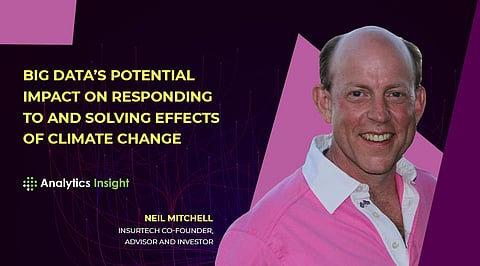

The intersection of data and science has always existed. The relationship between data and science continues to grow, bolstered by new tools for data collection, aggregation, analysis, and categorization. Applications for data-driven solutions are growing and prove particularly relevant in the fields of risk management and risk mitigation.
A recent article in Frontiers in Environmental Science states that sustainability climate issues can be better managed by using Big Data tools as the interrelationship between climate studies and data science expands opportunities to do so. "Data and systems science enables a large amount of heterogeneous data to be integrated and simulation models developed while considering socio-environmental interrelations in parallel," the authors write.
Improved data collection and knowledge integration have been demonstrated and can now be harnessed and used to face climate change and build a more resilient planet. This advancement in data science can aid in identifying, assessing, mitigating, managing, underwriting, pricing, and transferring climate-related risks.
This advancing science has even greater applications in risk transfer (re/insurance) and the public and private sector efforts to address the global insurance protection gap caused by the effects of climate change, according to Insurtech co-founder, advisor, and investor Neil Mitchell, who has been raising awareness on the subject for some time.
He recently answered questions about how this new technology can be harnessed.
Neil Mitchell: Data is the new gold, the new oil of the 21st century. Data is the precursor to information, knowledge, and wisdom. It is the critical ingredient to enable the discovery of new solutions that will fuel private and public sector collaboration and decision making on the critical actions required to close the costly effects of climate change and the growing global insurance protection gap."
Neil Mitchell: In this new world of data collection, analytic technologies, and rapid innovation, what was once unknown or little known and therefore uninsured, has become known, measurable, quantifiable, and insurable. The effect is an opportunity and an ability to provide programs that mitigate the effects of climate change and to further the closing of the global insurance protection gap caused by hurricanes, tornados, floods, droughts, heatwaves, rising oceans, pandemics, pestilence infestation, and environmental migration. Data illuminates, unlocks, enlightens, and enables decision making, creating new insights, risk management programs, and solutions for the perils arising from climate change. Decision-making support techniques and data-based models can offer a more comprehensive understanding of the complexities of climate change and enable the creation of new and improved risk management, risk mitigation, and risk transfer solutions.
Neil Mitchell: Climate change is an important issue, particularly with the proliferation of disasters. They are increasing both in frequency and severity and impacting areas across the world. One hundred-year and 500-year natural catastrophe events are now occurring multiple times a year – and on a yearly basis. The climate is changing with great velocity and that requires us to better understand, forecast, plan, and solve for these events using advanced data collection and analytic technologies.
Neil Mitchell: According to the research, Big Data, which helps process and connect large volumes of disparate information, can be coupled with machine learning that improves automatic prediction and decision processes. This can prove a viable tool in the toolbox for researching the interconnectedness of climate-related systems that are complex by nature.
Neil Mitchell: Necessity has paved the way for Big Data to be a stand-alone scientific discipline, as the complexities of modeling and analysis–as well as a significantly larger magnitude of data–are all required to make any kind of dent in global issues. Sustainability science is now clearly intertwined with data science. There are bigger problems in the world and the economy has become more circular. In other words, information garnered from one area can almost certainly be used in other fields. Imagine that confronting climate change is like trying to assemble a gigantic puzzle, but certain countries, organizations, sectors of the economy only have their specific puzzle pieces and have been largely unaware of where to find the other parts of the puzzle. This advancement in Big Data means that all the pieces can be gathered and revealed, enabling new solutions to be found and applied on a larger scale benefiting more people, communities, regions, countries, and businesses.
Neil Mitchell: What is fascinating to me is that we are now able to look at all aspects of climate change more comprehensively thanks to scientific and technological advancements. Now, humanity can harness those advancements to hopefully help our planet and its inhabitants by putting in place risk management, risk mitigation, and risk transfer solutions to better forecast, plan, protect and thereby make for a more resilient planet and society. Innovation and science like Big Data can now be used for a more profound and positive purpose, a greater good. I applaud Big Data experts and scientists for their passion and work. Their effort goes beyond a professional vocation and will have a profound and positive effect on humanity and the planet. Their work is purposeful and mission-driven.
Neil Mitchell, Insurtech Co-founder, Advisor, and Investor
Join our WhatsApp Channel to get the latest news, exclusives and videos on WhatsApp
_____________
Disclaimer: Analytics Insight does not provide financial advice or guidance. Also note that the cryptocurrencies mentioned/listed on the website could potentially be scams, i.e. designed to induce you to invest financial resources that may be lost forever and not be recoverable once investments are made. You are responsible for conducting your own research (DYOR) before making any investments. Read more here.
